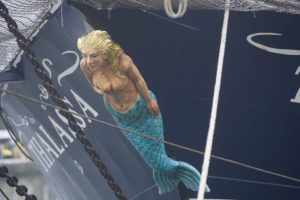
Catherine Moore
Déjà Voyage
I opened the front door to find a mermaid standing on my stoop, her carved body painted an aged teal green like the haint color used on the thresholds of Caribbean cottages. Under the protruding scales on her tail, paint had mottled away and wood grain showed through. The same soft fading dimmed her face. I could not tell if her expression was happy or sad. I could not make out if her spotted cheeks were stains or tears. She stood wooden and weathered. As if to remind me of my own tide’s arrival. “I buried you six years ago” I said, but invited her inside so the neighbors couldn’t watch.
~
Despite my effort in making watercress sandwiches and her taste of soundless tête-à-têtes, our perfect conversation was hampered by a rolling fog and a belching horn. Still, she was mute, like inaudible hope. I missed her in the mist. Sensed her lifeless breath, her dumb state. Reached through the brume to trace my fingers along her face, and I knew it is time to leave.
~
I applied dark lint for lashes,
crushed pimentos along her pout line,
wiped WD-40 across her decollate
then noticed a deep and worn crevice
where her left breast used to be.
The edge of woodcuts had gone silvery
soft except for rosy paint flecks
folded down like a naughty reveal.
~
She looked like every other petrified burlesque queen sitting in the convertible next to me. I nearly doffed her in my red wig since she’d gone paint-bald, but I loved how the skeleton of her hair still flowed in sculpted waves. It turned heads as we sped into town. The teak, her cheek, a tease. She carved a swath of admiration down Main Street. The butcher swore she adorned a scrimshaw he inherited from his mother. The baker embellished our crossed-buns with salty fins. We passed by the candle maker when she saw his cat drooling door-side. In each eye her steady gaze held, some discerned only mer, some caught maiden-poised. This grace was her gospel, I’m not sure why I had not seen this before. Hers was an incised beauty that fooled time into thinking it mattered.
~
Hallelujah for the haze of time, a maid’s lament, a matron’s rapture. This mermaid turned sea-woman, she confounded an idle beauty. Immortal. Though six years since her corpse was buried in shipyard rubble, I asked why she returned. I stared at this siren of candor. Coaxing her to share. And the fog returned. The blasted horns. Now, the revelation. How she was eyeful of the authentic. A glory in simplicity.
~
I left her where she asked, where she always
begged the winds to take her, and she curled
back into the sea as a gold nautilus, each spiral
like another song in her charmed ageless age.
The light and dark of crevices, like a pit of fruit
jagged and delightful despite its flesh torn away.
I saw she was both mortal and earth & water spirit.
At rest was the birthing of a goddess.
______________
Catherine Moore is the author of Story (Finishing Line Press, 2015), 921b Elysian Fields Avenue – Return to Sender (Kentucky Story Press, 2015), and Wetlands (Dancing Girl Press, 2016). Her poetry appears in Southampton Review, Cider Press Review, Wicked Alice, Blue Fifth Review, Caesura, Still: the Journal and in various anthologies. She won the Southeast Review’s 2014 Gearhart Poetry Prize. Catherine lives in the Nashville area where she enjoys a thriving writer’s community and was awarded a MetroArts grant. Catherine earned a Master of Fine Arts from the University of Tampa. She currently teaches at a community college and reviews poetry collections for literary journals. She is tweetable @CatPoetic.
Editor’s Notes: According to Wikipedia, figureheads—carved wooden decorations found at the prow of ships—were largely used between the 16th and 20th centuries. The figurehead embodied the spirit of a ship and was originally believed to placate the gods of the sea and ensure a safe voyage, with the figure looking down at the waves. The image used here is 2007 flickr.com photo by William Murphy of the tallship, Thalassa (http://www.tallshipthalassa.nl/en/).
